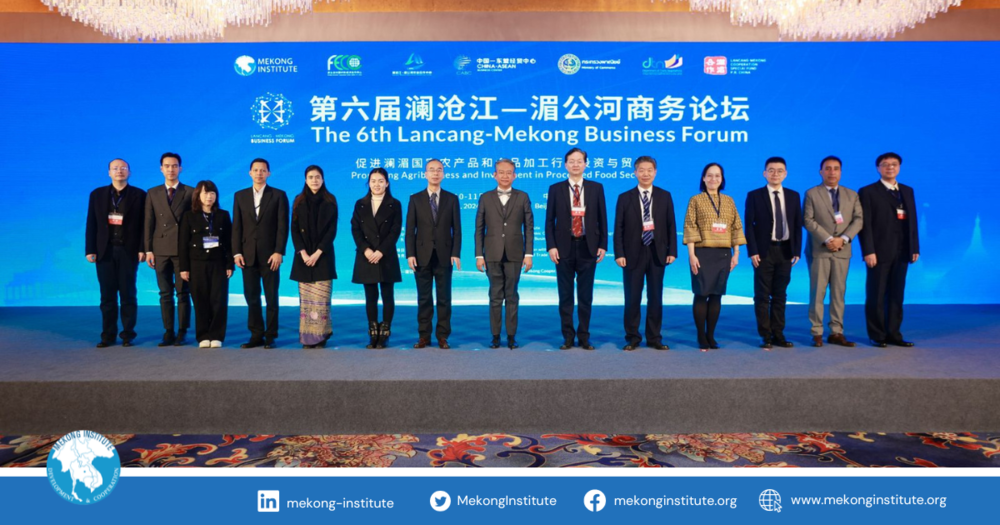Continuing its commitment to explore synergies and open up investment avenues for the key players of the agribusiness and processed food sectors in the Lancang-Mekong (LM) countries, Mekong Institute (MI), in collaboration with the Foreign Economic Cooperation Center (FECC) of the Ministry of Agriculture and Rural Affairs (MARA), China, and the China-ASEAN Business Center (CABC), hosted the 6th Lancang-Mekong Business Forum (LMBF) on January 10-11, 2024, in Beijing.
The 6th LMBF successfully convened over 180 stakeholders from the agrifood industry in LM countries including the private sector, government organizations, research institutes, business associations, and international organizations. This two-day gathering promoted green, innovative, and sustainable trade and investment in agribusiness and food processing. It featured discussions on sustainable technologies, products, and business models, underpinning the pivotal role they play in fostering a green and innovative landscape within these industries.
Mr. Suriyan Vichitlekarn, MI Executive Director, emphasized the importance of the forum in advancing regional cooperation, fostering innovation, and driving sustainable investments. “As we anticipate a rich discourse and networking, we look forward to witnessing the tangible outcomes and fruitful partnerships that will emerge from the seeds planted in this forum. We hope that today’s gathering will bring sustained growth to the agribusiness and processed food sectors in the Lancang-Mekong region,” said Mr. Suriyan.
Set against the backdrop of the vibrant city of Beijing, the forum delved into forging business linkages between Chinese companies and counterparts in LM countries. It spotlighted China’s agrifood processing market while addressing key aspects such as trade and investment policies, as well as incentives.
In a statement, Mr. Liao Junyun from China’s Ministry of Foreign Affairs – Department of Asian Affairs highlighted China’s commitment to advancing the liberalization of trade and investment. China advocates for mutual benefit, win-win cooperation, and common prosperity, showcasing a commitment to positive and collaborative international relationships.
Mr. Jing Chunhai, Counsel at the Department of Asian Affairs, Ministry of Commerce, highlighted the substantial progress in economic and trade cooperation between China and the five Mekong countries. Notably, the total trade volume reached 416.73 billion U.S. dollars in 2022, marking a significant 115% increase from 2015. The cumulative mutual investment surpassed 70 billion U.S. dollars, playing a vital role in advancing the economic and social development of each country involved.
Dr. Zhang Lubiao, Director General of FECC, outlined proactive measures to enhance agricultural economic and trade cooperation, leveraging opportunities like the Regional Comprehensive Economic Partnership (RCEP) Agreement, China-Laos railway, and China-ASEAN Free Trade Area (FTA) negotiations. The focus areas include fostering increased financial support for agricultural investment, establishing an agricultural investment information system, and creating an investment and trade cooperation platform.
Ms. Nalintib Homvisetvongsa, Minister at the Office of Commercial Affairs of the Royal Thai Embassy in Beijing, affirmed Thailand’s commitment to closer economic and trade cooperation among LM countries, leveraging existing FTAs for mutual prosperity. “I would like to assure you that the Thai Government is determined to work closely with LM countries to promote closer economic and integration, especially in the agribusiness and processed food sectors, to accomplish further mutual prosperity and well-being of the people in the GMS,” said Ms. Nalintib.
Mr. Zhang Weiwei, Managing Director of the CABC, introduced the LM Economic and Trade Cooperation Platform, providing participants with insights into its comprehensive framework for boosting economic and trade collaborations and promoting mutually beneficial initiatives among participating countries and stakeholders.
Forum discussions delved into trade and investment opportunities, green industry promotion, technological innovation, construction of agricultural industrial parks, and policy exchange. These discussions provided a holistic view of the strategic considerations and opportunities at the juncture of trade, investment, and technological advancements in the region.
A key feature of the forum was the business matching sessions, offering stakeholders the chance to explore business connections and establish partnerships. As input to the session, Ms. Wan Hongxiang from FECC introduced the profiles of participating 11 associations and 40 enterprises mainly from 14 Chinese provinces, autonomous regions, and cities. On the other hand, Ms. Hao Wen, MI’s Senior Program Coordinator, introduced the 6 participating organizations from Cambodia and five organizations each from Lao PDR, Myanmar, Thailand, and Viet Nam.
Dr. Yu Min, Deputy Division Director at FECC, zeroed in on the need to improve information services for LM agricultural economic and trade cooperation. Emphasizing the multifaceted functions of these services, Dr. Yu Min pointed out their significance in aiding decision-making for Chinese enterprises, supporting government references, and facilitating foreign investments in China.
The forum also provided participants a chance to explore exhibitions showcasing innovative food products and emerging technologies in food processing, packaging, and labeling. A structured learning visit to Beijing Pinggu National Agricultural Science and Technology Innovation Demonstration Zone was conducted during the second day of the forum. Participants had the unique opportunity to witness the developments in sustainable agriculture firsthand, fostering a deeper understanding of the strategies employed within the demonstration zone.
Among the highlights of the event was the ceremonial signing of the Memorandum of Understanding (MOU) between MI and FECC. This MOU is expected to further set the stage for enhanced cooperation between the two entities in agribusiness, food processing, and related economic initiatives.
The 6th LMBF is part of a long-term project funded by the Lancang-Mekong Cooperation Special Fund (LMCSF) of China. MI has organized business forums under the said project since 2018 in each of LM countries in coordination with the Ministry of Commerce of Thailand.
In his synthesis, Mr. Suriyan listed post-forum initiatives to sustain economic growth and cross-border collaboration across LM countries. These include continuous business interaction and investment opportunities, expanding sector engagement, building a robust business database, and replicating successful business models. Efforts will focus on developing cross-border value chains, adopting innovative technologies, streamlining agricultural trade, and collaborating with regional initiatives such as the GMS Program and ASEAN-China Cooperation. These initiatives underscore a commitment to sustainable economic development and shared prosperity within the LM region.
For more information about the business forum, please visit www.lancangmekongforum.com.








